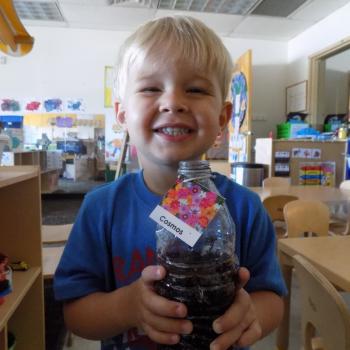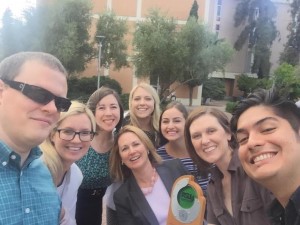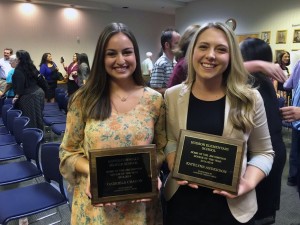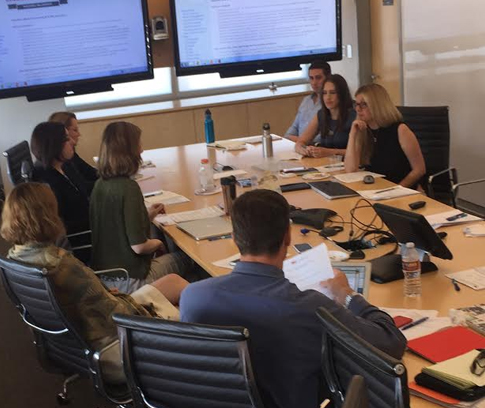More cards for different grade levels are coming soon, so keep in touch with SSE! In the meantime, try them out, and shoot us an email if you have any questions or comments.
While touring the Biodesign Institute on campus, the group stopped in to visit SSE and received a bilingual overview of the project, and an introduction to the Sustainability Education Framework for Teachers. They also took a virtual tour of the SSE courses, including the newly-launched two-week professional development class for in-service teachers, Integrating Sustainability Science into the Classroom (PD 101).
]]>Arizona State University (ASU) extends its efforts in sustainability education through a variety of programs for middle and high school students, like the ASU Poly Garden, which leases three of its 48 campus community garden plots to ASU Preparatory Academy’s sixth and seventh grade classrooms and high school environmental science students each semester. To date, the students have logged approximately 2,400 hours in the garden and donated more than 135 pounds of produce to the local food bank. ASU also manages two sustainability education programs, the Sustainability Science Education program and Sustainability Teachers’ Academy.
]]>2017 recipients of the Hartwell Award for Open Innovation were recognized: Michelle Obama, who has used her platform as first lady to advocate for poverty awareness, nutrition, physical activity and healthy eating; and Dave Eggers, for supporting creative writing and critical thinking through educational programs, and in promoting mechanisms which bring human rights issues to light.
By Jennifer Priest Mitchell
June 14, 2016
Teachers at every level struggle at times with keeping students engaged. But starting a lesson with a current event and questions to consider might better engage both students and educators. Consider Flint, Michigan’s water crisis. The contamination of Flint’s water supply can be explored from a variety of perspectives — interpreting data, exploring cause-and-effect relationships or even discussing the long-term impact of using bottled water to replace tap water. Questions on the issue that could be used in classrooms to teach many subjects include:
How do we know the water is contaminated?
How much fresh water is used in Flint schools each week?
Is clean drinking water a right, or a privilege?
With funding from the Bezos Family Foundation, Annie Warren, director of research and development at ASU’s Biodesign Institute; Leanna Archambault, associate professor at Mary Lou Fulton Teachers College; and Lee Hartwell, ASU-affiliated faculty, and Nobel Prize recipient (in physiology), are leading a team in developing an online tool kit for educators focused on sustainability education. The grant supports development of a Teaching Time Capsule, a tool for K–8 teachers to weave sustainability into existing course materials.
“Sustainability is something we hope teachers will work into every lesson so that it becomes a way of thinking for young people. It’s not a separate activity. Sustainability can be a part of all topics,” said Warren.
This TTC will be an interactive website providing access to teaching tools related to current events and other appropriate topics. By aligning the content with current education standards, Archambault said, the team hopes to make topics transferable across the curriculum.
Hartwell, Warren and Archambault are working with 25 other professionals in ASU’s office of Sustainability Science Education to create and implement the TTC. These colleagues make up the Sustainability Science Education Project Team, founded in 2011 and focused on sustainability science for the future through education of teachers.
“Sustainability is simply a way to look at an issue or a problem,” said Warren. “By discreetly putting sustainability into play while studying any social issue, teachers can creatively teach young people to consider implications of the many possible solutions to an issue and also to have a sense of wonder and curiosity about how problems came to be and what we can do, moving forward, to solve or prevent them.”
The time capsule will have two components. One will be free content, such as lesson plans, all tied to state and national standards. The other will be more enhanced materials for which users pay a nominal fee to download and modify.
Two online continuing education classes will also be available, so teachers can enroll and take advantage of the content without traveling or sacrificing classroom and personal time to grow and learn, Warren said. The team has hopes of expanding the online professional development opportunities over time.
Archambault emphasized that this project will include longitudinal research. “We’ve been wanting to track our results and see where we may have an impact because we never want to just assume that because we do something, we are making a difference. We want to find out what works and why.”
The website content will be developed in part by ASU alumni who are now teaching. They will share expertise and content they have already created and used with students
“Teachers are passionate about making the world a better place and that is what sustainability is all about,” Archambault said. “You don’t have to be passionate about every issue, but just be aware and know how to think about sustainability alongside other topics,” she said. “Teachers can reach educators and policymakers of the future, so infusing sustainability into lessons will prepare children to be successful leaders one day. We enhance our shared future by creating and making available resources for sustainability education.”
]]>
Sustainability education is infused into many activities at the preschool, including lessons on “making the Earth happy” by reducing water use, walking (as opposed to driving) more places and cutting down on the unnecessary generation of trash. For example, the playground has paper cups for children to use for drinking water. To see how many cups the school population generates, students saved paper cups for a week and strung them up as a garland. Even though paper cups can be recycled, bringing reusable water bottles to school is more sustainable. They have collected other forms of waste, such as plastic lids or the many types of packaging used for food, to create sculptures that remind people about making better choices for the environment. 
“We work to support the development of empathy and positive social interactions for young children,” said Allison Mullady, preschool director. “Our staff and leadership team create research questions based on our day-to-day experiences. We seek out partners, create projects and collect data on the ideas impacting our children.
“We know the early years are critical in shaping the brain and developing cognitive and social skills needed later in life,” Mullady added. “This method includes young children’s mind-sets about the future and how to care for our environment. I approached ASU’s Sustainability Science Education team at the Biodesign Institute to see how we could really embed these ideas of sustainability right from the start. We explored how to develop a curriculum that takes abstract concepts and relates them to everyday life.”
The Sustainability Science Education team is creating unique sustainability education experiences for many teachers, including those at the preschool. This team is led by Lee Hartwell, ASU-affiliated faculty and Nobel Prize recipient (in physiology); Annie Warren, director of research and development at ASU’s Biodesign Institute; and Leanna Archambault, associate professor at Mary Lou Fulton Teachers College.
“Children are incredibly observant. Providing unique opportunities to young kids, such as cleaning glitter-infused water with sponges, provides a creative way for them to draw connections to events like oil spills. Exploring these issues at a young age provides a necessary foundation for the critical consumption of knowledge in the future,” Warren said.
The preschool often partners with other entities to enhance the education and opportunities provided to students. A recent “Preschool Yogis” study with the College of Health Solutions allowed staff to review how yoga impacted the children’s self-regulation and problem-solving skills. During an eight-week project, teachers and parents reported an increase in the use of breathing strategies and other yoga techniques among children. The adults reported that the preschoolers reminded each other about the breathing exercises, calmed themselves through yoga and reduced their own stress.
“We have created a culture of use-inspired research,” said Mullady. “All of the research we conduct is organic and based on challenges or ideas from our own staff and children. We want the projects to have a direct benefit to the children, a value to families at the preschool and the potential to impact others in the greater early childhood community.”
The Mary Lou Fulton Teachers College Preschool has three classrooms that include a total of 40 children ranging in age from 3 to 5 years. Preschool students are placed in a classroom based on the “best fit” approach in which the staff and director consider many factors, such as age, teachers’ expertise and children’s strengths and needs.
The preschool has a 20-year history on the ASU campus. “Our lead teachers and instructional assistants are full-time ASU employees with extensive experience working with young children,” Mullady said. ”We also host many students and interns from education programs at ASU and Northern Arizona University. Our goal is to support early care and education through those who are training to become teachers and through a wide range of pre-professionals who can promote early education in their fields.”
In the past year, the preschool hosted more than 100 college students from programs in early childhood, special education, occupational therapy, speech and hearing sciences, nursing, nutrition and health promotion, university service learning, dance, drama and music therapy.
Preschool openings are available to children regardless of whether parents or guardians have an affiliation with the university. Located on ASU’s Tempe campus, the school is open 12 months per year, Monday through Friday from 7:30 a.m. to 5:30 p.m. A few openings remain for fall 2016. Interested families should contact the Mary Lou Fulton Teachers College Preschool at preschool@asu.edu or 480-965-9396 to learn more and set up a tour. To learn more about the preschool and the sustainability education happening there, view the video below or visit Mary Lou Fulton Teachers College Preschool. To learn more about sustainability education at ASU, visit ASU’s Sustainability Science Education team at the Biodesign Institute.
Relive some of our favorite highlights:
 Sustainability Science for Teachers (SCN 400) course content and research won the 2015 President’s Award for Sustainability.
Sustainability Science for Teachers (SCN 400) course content and research won the 2015 President’s Award for Sustainability.- The Office of Knowledge Enterprise Development awarded the staff at Biodesign on the SSE project the 2015 Vision Award for our research and course content.
- Victor Nevárez, our resident graphic designer, took home the Office of Knowledge Enterprise Development 2015 Innovation Award.
- We have received a project agreement to work on Phase 1 materials with Kamehameha Schools in Hawaii to develop content and conduct a needs assessment.
- We have successfully launched a new course for a general audience interested in Sustainability Science, Technology and Society, SCN 401. Open to both graduate and undergraduate students at ASU. It is all-online and is 7.5 weeks long.

- We are visioning how our 21st Century Skills course can transition into a Global Freshman Academy course with ASU’s EdPlus leading the way.
- Two former students and sustainability guru’s from 2012 won Rookie Teacher of the Year at Tempe Elementary School District.
We are so excited to see what 2016 has in store for us all!
]]>We’re excited to introduce Phase 1 of our new website! In addition to a fresh, clean design, you’ll find:
- A more detailed listing of the many facets of our project
- Information on our growing catalog of courses
- Detailed listings of our research publications
- Regularly updated blog posts that relate to sustainability science, teacher and educator preparation, and the latest SSE news
- The return of some of our most popular content from the original webpage, including Teaching Tools and an overview of the Four Ways of Thinking.
The future of SSE is bright, so keep checking back for more updates and let us know if there particular elements you would like us to include! We look forward to achieving our mission, one educator at a time!
]]>
According to Dr. Richard DuFour (2004), a field expert on collaborative learning and teaching, “the powerful collaboration that characterizes professional learning communities is a systematic process in which teachers work together to analyze and improve their classroom practice.” SSE takes this sentiment to heart. We place an emphasis on collaboration rather than teaching in isolation, and encourage ongoing analysis of successes and failures in teaching practices and student achievement. Although the term “PLC” can apply to numerous different types of groups — from curriculum committees at district offices, to a set of 4th grade teachers who team-teach — the idea and goals should uniform across the board. It supports the notion that “the core mission of formal education is not simply to ensure that students are taught, but to ensure that they learn” (DuFour, 2004). By working in a collaborative team environment that is constantly considering whether or not the student audience is benefiting from lessons and techniques, PLCs should be able to quickly and efficiently modify their practices to fit their target.
 Traditionally, PLCs take the form of face-to-face meetings either on a weekly, monthly, or quarterly basis, but sometimes that’s not enough. Our answer to this is a hybrid PLC, where there are in-person components on a regular basis in addition to an online library of content that can supplement knowledge throughout the day. Quite a bit of time and work was invested up front to put our PLC wiki together, but it pays off semester after semester as the process becomes more streamlined. On the wiki, a substantial database of pertinent information has been built, including a week-by-week curriculum guide that all instructors follow. These curriculum guides summarize the focus of each class through an introduction prompt, a brief audio file narrating the topic and lesson, classroom management techniques for each day, related state standards, and the actual lesson plan that divides out the in-class time in detail. Additionally, this wiki has a section on tips for success, a “know your student” page, email templates that instructors can use for standardized correspondence with individual students, detailed (and regularly updated) calendars for each week, and PowerPoint support presentations that go beyond our normal curriculum to act as interventions for students and classes who are struggling with time and stress management, digital citizenship, and other topics.
Traditionally, PLCs take the form of face-to-face meetings either on a weekly, monthly, or quarterly basis, but sometimes that’s not enough. Our answer to this is a hybrid PLC, where there are in-person components on a regular basis in addition to an online library of content that can supplement knowledge throughout the day. Quite a bit of time and work was invested up front to put our PLC wiki together, but it pays off semester after semester as the process becomes more streamlined. On the wiki, a substantial database of pertinent information has been built, including a week-by-week curriculum guide that all instructors follow. These curriculum guides summarize the focus of each class through an introduction prompt, a brief audio file narrating the topic and lesson, classroom management techniques for each day, related state standards, and the actual lesson plan that divides out the in-class time in detail. Additionally, this wiki has a section on tips for success, a “know your student” page, email templates that instructors can use for standardized correspondence with individual students, detailed (and regularly updated) calendars for each week, and PowerPoint support presentations that go beyond our normal curriculum to act as interventions for students and classes who are struggling with time and stress management, digital citizenship, and other topics.
Finally, instructors meet weekly to develop a shared vision of purpose, and work together to fine-tune all prepared lessons and materials. This is a face-to-face chance to collaborate on best practices in the classroom and evaluate how lessons and topics can be re-conceptualized for different learning audiences. Detailed notes are taken and considered for the following week and semesters to come. When surveyed regarding the face-to-face elements of our PLC, instructors reported that they benefited from building rapport with others, the sharing of knowledge, the opportunity to lend and receive advice. Through this feedback, it’s easy to see that “Professional Learning Communities” are properly named, as they are in fact a community. As we progress further into the 21st century, SSE believes that it’s inevitable that we will see more and more PLCs develop in the hybrid and all-online format in order to adapt to the technology and time demands of our professions.
-